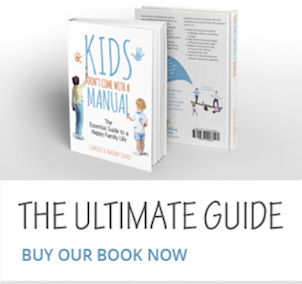Nowadays, there is a lot of pressure on parents and we can easily fall into the trap of wanting to be the ‘perfect’ parent. There are a plethora of books and websites that offer advice on everything from your child’s first day at school, through to sibling rivalry and temper tantrums. Whilst such advice can undoubtedly be helpful, the sheer volume of it means that it can also end up having the opposite effect, where parents feel so confused by all the conflicting messages that they lose faith in their own ability as a parent. After all, with so much advice on offer, how on earth are parents supposed to know exactly who to listen to?
In fact, striving to be the ‘perfect’ parent can cause us to feel as if we are constantly failing because we never seem to get it ‘exactly right’. The reality is that there is no single perfect parenting style, and the best we can do as parents is to find a good ‘balance’ between a stricter approach and a softer one.
Striving to be a ‘perfect parent’ is a recipe for disaster because it is usually a recipe for parents to develop a lot of guilt. Feeling guilty can produce hormones such as cortisol that creates more anxiety and does not help us react in effective ways. Our children can also pick up on this and it can feed their ‘mis’behaviour.
The recipe to feel less of this guilt is to learn to recognise that while we may not be able to significantly change our value system or our individual parenting style, we can change the way that we prepare for, and more importantly respond to, the parenting challenges that we are faced with on a daily basis. We can prepare ourselves for issues by learning to anticipate conflict and ‘mis’ behaviour before it happens, so that we can then choose to be more measured and balanced in our approach to the situation. In other words, we can choose to be less reactive and more strategic in our response to our children’s behaviour, particularly when they push our buttons.
For example, when we come home after a long day at work, we just want to relax, be ourselves and enjoy our kids. We usually arrive with a very good predisposition to love them and spend quality time with them. Unfortunately, because we may be feeling tired and hadn’t anticipated the challenges that they have decided to throw our way, we can then get triggered by their behaviour. In other words, we react rather than respond to our children’s behaviour.
What we must remember is that no matter what our individual parenting style may be, we all have choices and options about how we react in any given situation. We do not actually have to deal with ‘mis’behaviour instantly. It is actually much better to tell our children that we don’t approve of their behaviour, but that we will not deal with it immediately as this risks us getting angry at them and losing the connection. Realising this and the fact that we can always exercise self-control through the choices that we make, maximises our chances of raising happy and confident children. Remembering that you always have choices, allows you to achieve balance and harmony in your family life by remaining calm in challenging situations, without compromising your values as a parent.
Children like to know what is going to happen in advance, and to be ‘involved’ wherever possible. Therefore, they are far more likely to comply with your requests if they have agreed to it in advance. So, try to plan ahead wherever possible by creating a prior agreement with your child about what is expected of them, and what they can expect from the situation, whether that be a trip to the supermarket or a visit to a friend’s house. We can also empower our children by offering them limited choices (both of which suit us) – for example, “Would you like to brush your teeth now or in five minutes?” Like adults, children have a fundamental need for autonomy. So, when they learn that you are prepared to trust them with decisions, they are far more likely to cooperate with you in future.
Lastly, it is important that as parents, we learn to forgive ourselves for our mistakes, and instead view them as an opportunity to learn and find a way to do things differently.
These are just a few of the tips that we share in our book Kids Don’t Come With a Manual. In case you haven’t gotten hold of it yet, you can buy it here.












































